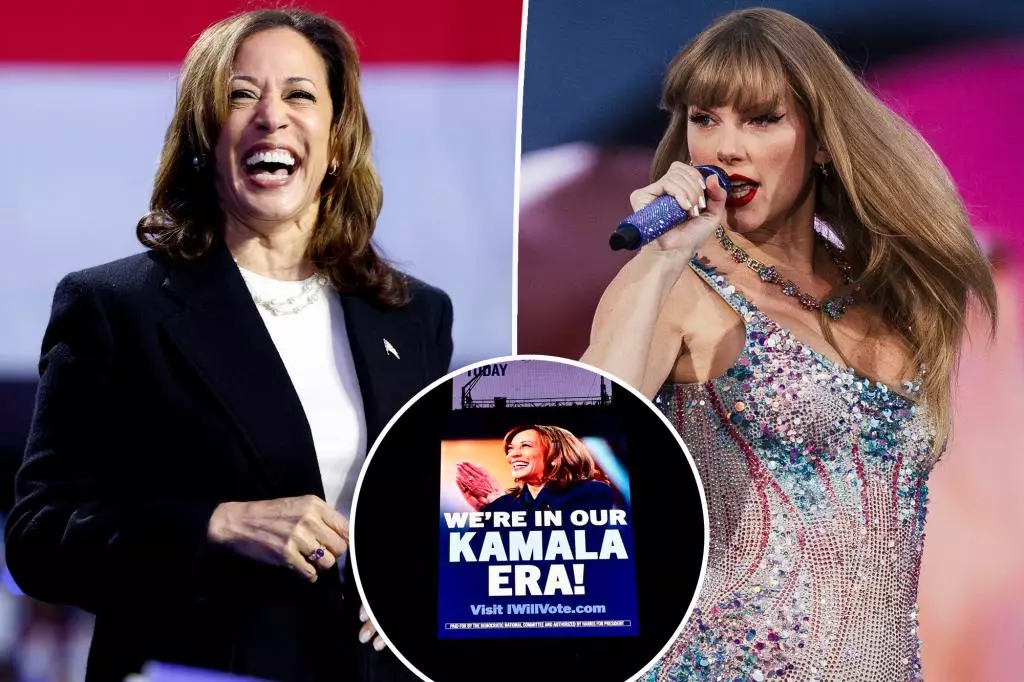In an intriguing intersection of pop culture and politics, the recent endorsement of Vice President Kamala Harris by global music sensation Taylor Swift signifies a shift in voter engagement strategies as the 2024 Presidential election approaches. Swift, often recognized for her ability to mobilize her fanbase, has traditionally maintained a level of political neutrality. However, her announcement on Instagram, declaring her support for Harris and her running mate Tim Walz, positioned them favorably among a demographic that admires her considerably. This development, along with subsequent marketing efforts by the Democratic National Committee (DNC), reflects an understanding of the nuances of contemporary voter dynamics.
The DNC has wasted no time capitalizing on Swift’s endorsement. Newly unveiled billboards in New York’s bustling Times Square project the message of a “Kamala era,” a slogan that encapsulates the campaign’s intent to refresh and energize the political narrative around Harris. The initiative makes use of Swift’s popularity, cleverly referencing her song “Ready for It?” to connect the campaign’s themes with the sentiments of Swift’s fanbase, applying a strategy that blends popular culture with political messaging.
Taylor Swift, in her endorsement post, elaborated on her belief in Harris as a “steady-handed, gifted leader.” This characterization appeals to voters who seek stability and competence in political leadership, particularly crucial in a climate often described as tumultuous. Swift’s specific praises of both Harris and Walz’s track records on significant issues, including LGBTQ+ rights and women’s autonomy, attempt to rally progressives who are passionate about these causes.
Such endorsements can be powerful political tools. Within a mere 24 hours of Swift’s announcement, voter registrations reportedly surged by more than 400,000. This statistic underscores the influential potential of celebrity endorsements, particularly when they resonate with young voters who may otherwise feel disenfranchised from the voting process. Swift’s fans, affectionately dubbed “Swifties,” represent a demographic that is increasingly politically active, and her endorsement could help channel their passion into voter mobilization.
Interestingly, the response from the opposite end of the political spectrum demonstrates both concern and strategy. Donald Trump’s campaign attempted to reclaim attention by launching a sales initiative mimicking Taylor Swift’s successful merchandise line from her Eras Tour. This move appears to be a somewhat desperate attempt to attract Swift’s fanbase; however, it also reflects a recognition of her significant influence. While Trump dismissed Swift’s endorsement of Harris, stating an affinity for another celebrity, his campaign’s efforts to capture Swift’s audience suggest an underlying anxiety about losing traction in the face of her endorsement.
This scenario also raises questions about authenticity and the effectiveness of using popular culture in political campaigns. While Trump’s mimicry might attract some attention, it doesn’t inherently offer the substantive engagement or connection that Swift’s endorsement provides. The authenticity of such gestures often plays a crucial role in determining their impact; transient marketing efforts can often backfire if not backed by genuine content or relatable themes.
As the campaign progresses, it will be fascinating to observe how the relationship between celebrities and politics continues to evolve. With Swift utilizing her platform to resonate with the issues she values, the potential for celebrities to generate substantial political discourse becomes increasingly relevant. If other influential figures follow Swift’s lead, it might further blur the lines between entertainment and political engagement in contemporary elections.
Ultimately, these developments compel political strategists and candidates alike to reconsider how they communicate and connect with voters. As the race for the presidency heats up, voters will likely seek authenticity—something that can emerge from the interplay of pop culture and political engagement, with Taylor Swift standing at the forefront of this evolving narrative.

